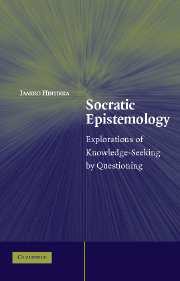Book contents
- Frontmatter
- Contents
- Acknowledgments
- Introduction
- 1 Epistemology without Knowledge and without Belief
- 2 Abduction—Inference, Conjecture, or an Answer to a Question?
- 3 A Second-Generation Epistemic Logic and its General Significance
- 4 Presuppositions and Other Limitations of Inquiry
- 5 The Place of the a priori in Epistemology
- 6 Systems of Visual Identification in Neuroscience: Lessons from Epistemic Logic
- 7 Logical Explanations
- 8 Who Has Kidnapped the Notion of Information?
- 9 A Fallacious Fallacy?
- 10 Omitting Data—Ethical or Strategic Problem?
- Index
- References
Introduction
Published online by Cambridge University Press: 05 June 2012
- Frontmatter
- Contents
- Acknowledgments
- Introduction
- 1 Epistemology without Knowledge and without Belief
- 2 Abduction—Inference, Conjecture, or an Answer to a Question?
- 3 A Second-Generation Epistemic Logic and its General Significance
- 4 Presuppositions and Other Limitations of Inquiry
- 5 The Place of the a priori in Epistemology
- 6 Systems of Visual Identification in Neuroscience: Lessons from Epistemic Logic
- 7 Logical Explanations
- 8 Who Has Kidnapped the Notion of Information?
- 9 A Fallacious Fallacy?
- 10 Omitting Data—Ethical or Strategic Problem?
- Index
- References
Summary
If Thomas Kuhn had not sworn to me a long time ago that he would never again use the p-word, I would have been tempted to introduce my viewpoint in this volume by saying that contemporary epistemology draws its inspiration from an incorrect paradigm that I am trying to overthrow. Or, since the individuation of paradigms is notoriously difficult, I might have said instead that our present-day theory of knowledge rests on a number of misguided and misguiding paradigms. One of them is in any case a defensive stance concerning the task of epistemology. This stance used to be expressed by speaking of contexts of discovery and contexts of justification. The former were thought of as being inaccessible to rational epistemological and logical analysis. For no rules can be given for genuine discoveries, it was alleged. Only contexts of justification can be subjects of epistemological theorizing. There cannot be any logic of discovery, as the sometime slogan epitomized this stance—or is it a paradigm? Admittedly, in the last few decades, sundry “friends of discovery” have cropped up in different parts of epistemology. (See, for example, Kleiner 1993.) However, the overwhelming bulk of serious systematic theorizing in epistemology pertains to the justification of the information we already have, not to the discovery of new knowledge. The recent theories of “belief revision”—that is, of how to modify our beliefs in view of new evidence—do not change this situation essentially, for they do not take into account how that new evidence has been obtained, nor do they tell us how still further evidence could be obtained.
- Type
- Chapter
- Information
- Socratic EpistemologyExplorations of Knowledge-Seeking by Questioning, pp. 1 - 10Publisher: Cambridge University PressPrint publication year: 2007



